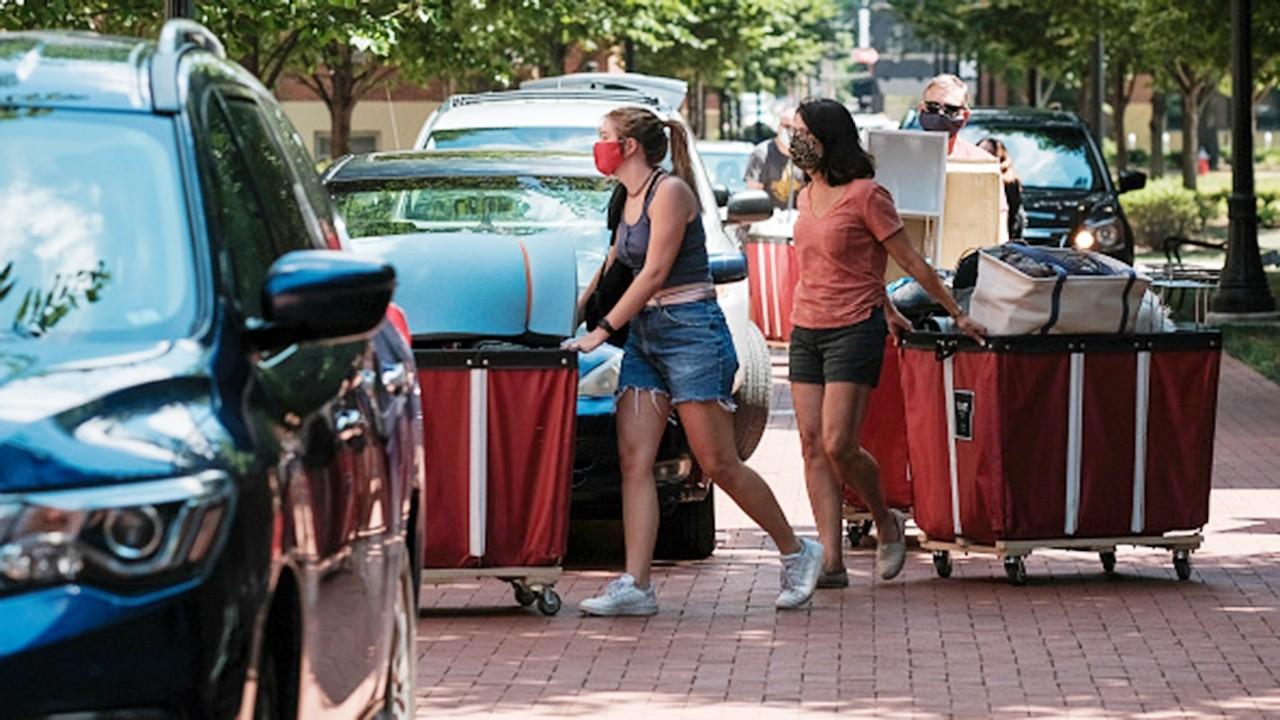New coronavirus cases below 50,000 in US for sixth straight day
COVID-19 death toll tops 174,000 as total infections exceed 5.5 million in the U.S.
New daily coronavirus cases continued to drift down from July highs this week, but deaths remained elevated, a legacy of the surge of new infections that swept the South and West last month.
Across the U.S., 44,023 new coronavirus cases were reported Thursday, the sixth day in a row with fewer than 50,000 cases.
At the same time, the number of new tests performed nationally fell by more than 200,000 to 635,809 Thursday from 880,729 a week earlier, according to data from the Covid Tracking Project.
The seven-day average of tests across the U.S. fell to 709,796 from 736,273 over the same period. That metric had climbed as high as 822,583 in late July.
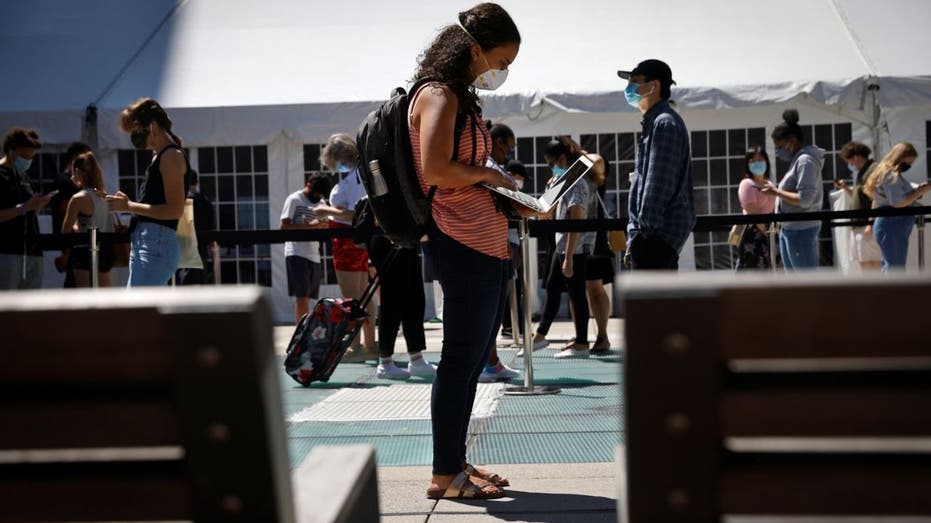
A COVID-19 testing site for returning students, faculty and staff on New York University’s main campus in Manhattan on Tuesday. (MIKE SEGAR/REUTERS)
EVEN WITH A STRONG CROP THIS YEAR, US FARMERS ARE SUFFERING
Experts have said robust testing and contact tracing are critical tools to managing the virus’ spread. Overwhelming demand for diagnostic tests in July strained supply chains and led to lab backlogs and delayed results, impeding containment efforts. Amid the demand, some states opted to narrow testing criteria to focus on those with symptoms or who are high risk.
The total number of confirmed coronavirus cases across the U.S. climbed to nearly 5.6 million, accounting for just under a quarter of the global tally of 22.7 million, according to data compiled by Johns Hopkins University. The nation’s death toll rose to more than 174,000.
Across the U.S., 1,078 deaths were reported Thursday, the 14th day since the beginning of August with more than 1,000 reported deaths. In July, there were 11 days with more than 1,000 deaths reported and in June there were three.
Nearly half of the deaths recorded Thursday came from four states that emerged as major hot spots last month: Texas, California, Florida and Arizona. Reporting standards vary state to state, so deaths reported on a certain day may not have happened on that day.
However, the persistently elevated death toll is reflected in the seven-day average of deaths across the U.S., which hasn’t dropped below 1,000 since July 26, according to a Wall Street Journal analysis of data from Johns Hopkins. That metric was closer to 500 at the beginning of July. Experts say deaths lag new cases, as the disease often progresses over the course of several weeks.
A change could be on the horizon, as hospitalizations appear to be declining. For Aug. 20, 41,988 people in the U.S. were hospitalized, down from 47,228 a week earlier, according to the Covid Tracking Project. The number has largely been falling since around the end of July.
Precise data on hospitalizations has been limited by uneven reporting across states and changes at the federal level, after hospitals earlier this summer were directed to report data to the Department of Health and Human Services rather than the Centers for Disease Control and Prevention.
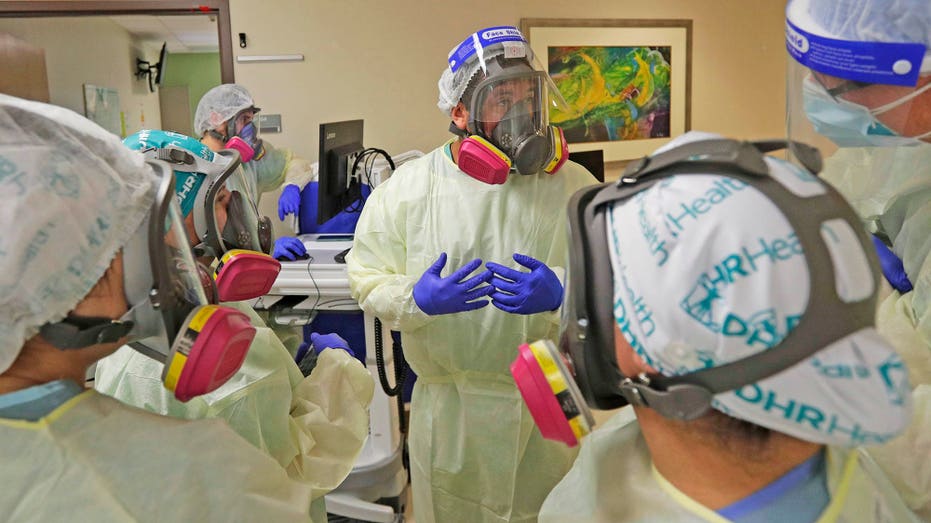
Medical personnel confer about COVID-19 patients at DHR Health, Wednesday, July 29, 2020, in McAllen, Texas. (AP Photo/Eric Gay)
PARENTS PROTEST BIG 10 CONFERENCE’S DECISION TO POSTPONE COLLEGE FOOTBALL
HHS this week turned responsibility for data collection back over to the Centers for Disease Control and Prevention. The change in course comes amid increasing reports that the new system has been plagued by delays and inconsistencies in data since being implemented in July.
But the country’s percent of positive tests has also declined, another positive sign. The seven-day average positivity rate for the U.S. was 6.48% for Aug. 20, down from 7.5% a week ago and 8.48% a month before, according to data from the Covid Tracking Project.
Of Thursday’s new cases, roughly a third were concentrated in three states that were hot spots throughout July. Texas added over 5,000, California added nearly 5,000 and Florida added more than 4,000. Nearby, Georgia reported more than 2,000 and North Carolina added 1,979, its highest tally in the past two weeks.
Iowa reported more than 1,000 new cases in a day for the first time since the pandemic began. Illinois, Missouri, Ohio and Tennessee also all added more than 1,000 cases, with Alabama nearly adding that many as well.
The seven-day average of new cases in California, Florida, Georgia, Ohio, Tennessee and Alabama is lower than the two-week average, according to a Wall Street Journal analysis of Johns Hopkins data, suggesting cases are declining. In Illinois, Iowa and Missouri, the seven-day average topped the two-week average for the last four days of reporting or more. When the one-week average tops the two-week average, it suggests cases are increasing.
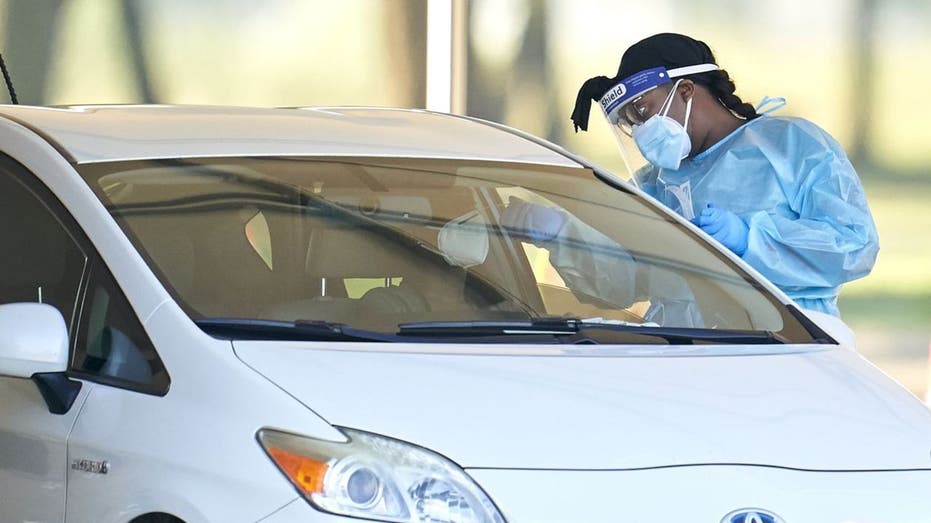
A health-care worker performs a swab test at a COVID-19 drive-through testing site at Dallas College Eastfield Campus in Mesquite, Texas, on Tuesday. (COOPER NEILL/BLOOMBERG NEWS)
‘MICRO-WEDDING’ TREND SPARKED BY CORONAVIRUS BRINGS BUSINESS BACK TO HOTELS
States have enacted various restrictions to try to stop the virus from spreading, but many are also trying to juggle a number of other challenges, from safely starting the school year to containing wildfires.
Red Cross workers were putting in place safety procedures for Covid-19 at temporary shelters as wildfires threatened thousands of California homes.
Poor air quality due to fire forced the closure of a coronavirus testing site in Pleasanton, Calif., east of Oakland.
In Michigan, the state’s Court of Appeals upheld a lower court’s ruling that Gov. Gretchen Whitmer was acting within her right under the Emergency Powers of Governor Act in declaring a state of emergency. The appeals court also said she was acting within the extent of those powers in extending that declaration of emergency and issuing related executive orders. The legislature challenged the governor’s power related to those authorities in a lawsuit earlier this year.
A spokeswoman for Michigan Senate Majority Leader Mike Shirkey said in an email that the decision will be appealed to the state Supreme Court and that Mr. Shirkey still believes “the governor is abusing the law.”
New York Gov. Andrew Cuomo said Friday that the declining number of coronavirus cases across the state indicate it is safe to reopen schools, but that schools can’t open until parents and teachers have confidence in reopening plans.
His remarks, made on NBC’s Today Show Friday morning, come days after the leader of the New York City teachers union threatened to go to court or strike if the city doesn’t adopt the union’s safety measures for reopening schools, including widespread testing. School is scheduled to begin Sept. 10 in New York City, the nation’s largest district and one of few large districts planning for some in-person learning.
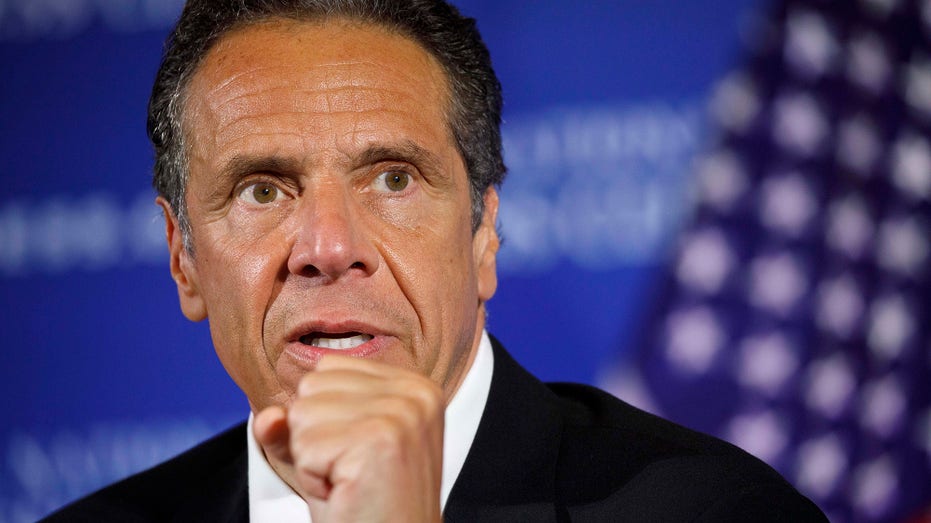
New York Gov. Andrew Cuomo said Friday that the declining number of coronavirus cases across the state indicate it is safe to reopen schools, but that schools can’t open until parents and teachers have confidence in reopening plans. (AP Photo/Jacquel
GET FOX BUSINESS ON THE GO BY CLICKING HERE
“What I’ve said from day one is if the parents aren’t happy and confident and if the teachers aren’t confident, then you don’t have a school district reopening,” Mr. Cuomo said, adding that the state’s 700 school districts could end up with 700 different reopening plans.
In other parts of the world, India reported 68,898 new cases, as the nation’s total approached three million, data from the Health Ministry showed. India’s death toll rose to 54,849, including 983 new fatalities.
Indian authorities are expected to review next week whether to extend lockdowns in containment zones that are scheduled to be lifted at the end of the month.
World Health Organization Director-General Dr. Tedros Adhanom Ghebreyesus cautioned that some countries that had long periods with little or no transmission of the virus are a “cautionary tale” for places seeing drops in cases.
“Progress does not mean victory,” he said Friday. He also warned that a vaccine alone won’t solve the pandemic.
New Zealand, which is fighting a new outbreak of the virus, recorded 11 new cases. Officials say they are confident they can contain the outbreak and will decide Monday whether an extension of the lockdown in Auckland is needed.
READ MORE ON FOX BUSINESS BY CLICKING HERE




















